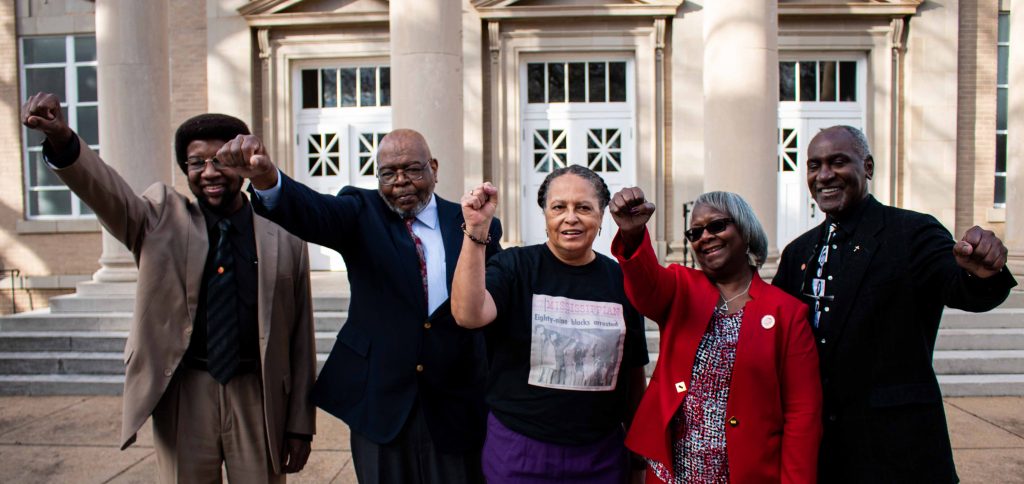
The integration of the University of Mississippi by James Meredith in 1962 set a precedent of racial tension that would reverberate throughout the campus for years to come. With the founding of the Black Student Union happening around 1968, African American students — approximately 200 of the over 7,000 total population — were forced together by a need for community and organization against their treatment from the administration and fellow student body, according to Donald Cole.
“I was scared, but (we) had to act brave,” he said. “The good feeling was that I think we got a message over… We felt like the message was going to go beyond our other protests, go beyond the Mississippian.”
Cole, now retired, was an associate professor of mathematics and an assistant provost and assistant to the chancellor for multicultural affairs at Ole Miss. Since 1993, he made an impact on the university as a faculty member. However, it was 23 years earlier when he and 88 other black students sat in jail cells in Lafayette County and Parchman for standing up against the racism perpetuated at the same university.
Waking up on the morning of Feb. 25, 1970, Cole wasn’t expecting that the BSU’s next protest would trigger a series of events that ended with nearly half of the school’s black population arrested, on probation and eight of them suspended.
Up with People is a non-profit organization founded in 1965 that focuses on fostering intercultural communication and bettering communities through travel, volunteering and musical performances. On that night in 1970, this interracial group was hosting a concert in Fulton Chapel.
“We heard that this group was going to be on campus,” Cole said, referring to Up with People. “That was just an optimal time to protest … It was no different than the last protests — no different than the protest that was going to happen tomorrow.”
Sitting in the back of Fulton Chapel last week, Cole and Kenneth Mayfield, another of the students arrested and one of the eight suspended, recollected that day’s events.
Mayfield is a lawyer experienced in bankruptcy and social security disability insurance with offices in Tupelo, Southaven and Memphis. Recalling the time before the Up with People protest, he remembered some debate amongst the members of the BSU about protesting an event that was supposed to be about peace and love.
“Somebody else said, ‘Well, it’s the right time to do it. It’s the right group,’” Mayfield said, “But it was mainly because it was going to be covered by the press, and we needed press to get our word out.”
“The word” wasn’t just about the treatment of black students at Ole Miss. The group had also been pushing a list of 27 demands to better their condition on the campus and for future black students.
These demands included “the incorporation of black studies programs highlighting the contributions of black people in the fields of literature, history, the fine arts, etc., the hiring of black employees (clerks and secretaries) other than janitors, cafeteria workers and groundsmen (paper and leaf scavengers), and black staff on ‘the Mississippian.’”
These are just a few of the demands the BSU had already presented to then-chancellor Porter L. Fortune, Jr. days before the Up with People concert, a continuation of the protests they had been doing throughout Black History Month.
At the time, the BSU had been under the surveillance of the Federal Bureau of Investigation and the Mississippi State Sovereignty Commission since at least January 1969, according to requested documents. An informant, whose name was redacted in the files, had successfully infiltrated the BSU since at least November of the same year. Mayfield learned of this information while writing one of his books, and Cole became aware just two weeks ago.
“You couldn’t believe somebody would be a traitor,” Mayfield said. “I mean, that just wouldn’t cross my mind.”
Cole, considering himself a loving individual, questioned if he could possibly still love that person after finding out that they were an informant.
“I really don’t want to face that,” he said.
When the group made its way to Fulton Chapel, Mayfield, who was toward the end of the line, overheard John Cleveland, who was leading the group, discussing an entry fee of $2 to get inside the concert.
“I didn’t have $2 to my name,” Mayfield said, chuckling, “I was ready to turn around.” Cleveland, described as fearless, insisted that they had “already paid (their) due,” and led the group inside.
The protest was not extensively planned, and Cole was anxious as he followed his peers inside.
It wasn’t long before Up with People’s song “What Color is God’s Skin?” was interrupted, and the protest was in full force. Cole noted the contradiction of the crowd’s enjoyment of that particular song and the hostility exhibited toward African Americans on campus.
The BSU couldn’t fathom that when they eventually departed the stage to march out, they would be met by a number of highway patrolmen with guns pointed at them.
“To see those weapons,” Cole said, “and to know that I was on an unfriendly campus, that’s when a lot of the realization came to me.”
The patrolmen rounded the students up and arrested them. Packed into vehicles and driven away from campus, they were jailed between 24 and 48 hours. Mayfield recalled his time in the Lafayette County Detention Center, dressed in all black — the uniform of the black Panthers, beret and combat boots included. He remembered looking to the floor to see his beret had fallen after being accosted by an officer with a baton.
Neither Mayfield nor Cole slept well that night, they said.
As the news of the protest and arrests spread, eight of the students were punished further by the university, resulting in them being put on trial to determine if they would be allowed to continue their education at the university. John Brittain, the lawyer representing the eight, was able to avoid criminal charges for the students.
After the disciplinary trial, and even after the reiteration of the fact that their protest was nonviolent, the eight were ultimately expelled. Linnie Liggins, who had technically completed all of the credits needed to graduate, was not even given her diploma.
Forced out of the university, the eight sought education and employment beyond Oxford, and none of them looked back — except for Cole.
He couldn’t exactly say why he came back for a doctoral degree in 1977.
“Something drove me,” he said, “I just kind of felt the need. So, I came back as a student and was very lowkey.” He didn’t want what happened in 1970 to interfere with his academics. He wanted to assume that no one in his department knew of his past so he would at least have a fair shot.
Fifty years later, though, many of the eight returned.
Last week, Cole, Mayfield, Liggins, Henrieese Roberts and Theron Evans came back to campus alongside some of the other 89 people who were arrested to celebrate Black Power at Ole Miss, a series of events on Feb. 24 and Feb. 25 to “offer them a chance to kind of take back the space, reconnect with each other and ask them the question of repair,” according to Garrett Felber.
Felber is an assistant professor of 20th century African American history. Felber organized Black Power at Ole Miss with the Arch Dalrymple III Department of History and the Division of Diversity and Community Engagement.
Today, many of the 1970 BSU’s demands have been fulfilled, at least to some extent. Even the activism in recent years for the removal of Confederate monuments on campus, for example, appears to be fruitful, though deeper issues, like buildings named after slave owners, the moniker “Ole Miss” and others still stand. Felber offered, for instance, that one thing he has been pushing for is a cluster hire of black faculty at Ole Miss to raise the percentage from the 6% who currently work here. He believes that the question of repair spurred by the return of the students from 1970 will be an ongoing process.
“I hope that people here will hold the administration’s feet to the fire and make sure that they actually follow through,” Felber said, “It’s easy for them to say, ‘We’re going to continue these conversations,’ and once people leave, those conversations stop.”
W. Ralph Eubanks, a professor of Southern studies, English and honors, emphasized the uncertainty in the question of repair on campus.
“You think about everything that happened,” he said. “As an institution, we really failed these people… Can we actually make up for that? I don’t know if we can. But can we continue to fail our students of color? And we know the answer to that is no.’”
Eubanks remembered when he became a student here in 1974.
“Knowing about what happened here in 1970 cast a shadow over every black student here because we knew what the university might do if we chose to do what those students did,” he said.
Because of the past, Eubanks encourages us to pay attention, lest we repeat our mistakes. He has noticed previously that many people would simply walk past a protest with no attempt to engage, crediting that to a culturally ingrained fear of being reprimanded for “stepping out of line.” According to him, we all have a responsibility to engage.
“We have to be willing to engage in some level of conflict in order for things to get better,” Eubanks said, “because if we’re conflict averse, then all of a sudden things just explode, and that’s really what happened in 1970.”
























